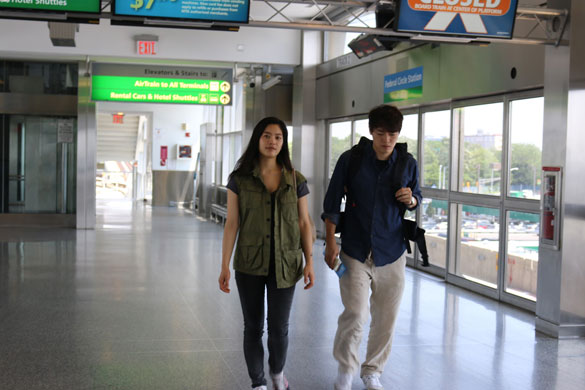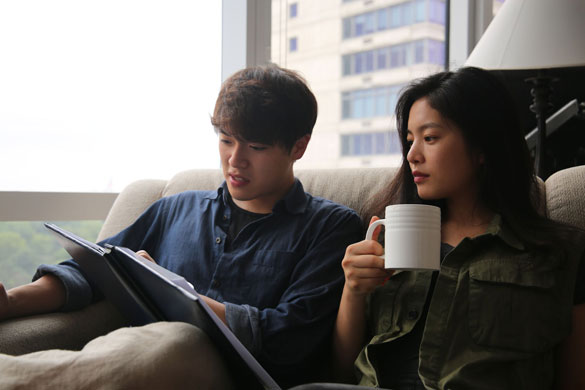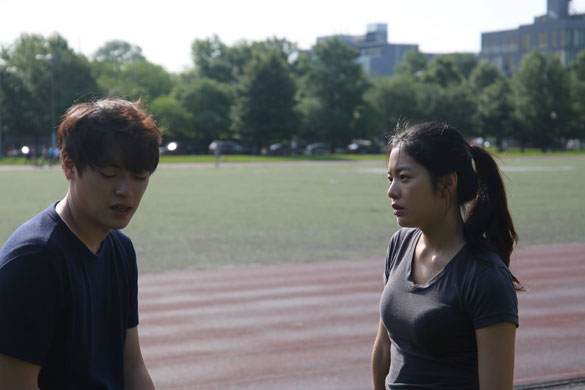
 |
|||
"10am, JFK airport: Han-chul waits for Nari near the air-train. Han-chul is a documentary filmmaker visiting from Tokyo; Nari, a working actress living in New York City. The two reunite after a year apart only to discover that living in different hemispheres has affected their relationship. One day, free-spirited Han-chul travels to Berlin on a job assignment, only to return to New York City to discover that Nari has left to Korea to star in a new drama.
Review: Over the years through recent times to the present day, independent films have had a fairly rough ride within the Korean cinema industry, and increasingly so. With big name, big power film companies having such a hold on the industry as a whole, their noticeable focus on big budget productions and the placing of blockbusters on a veritable multitude of screens has invariably left smaller independent film-makers with significant difficulties in terms of funding projects; getting films completed, released and distributed; and indeed in the subsequent securing of anything much more than a minimal number of cinema screenings.
As Sesang opens, we are introduced to Nari as she attends a (likely, post-screening) Q&A in which visually blurred film-makers are asked about their problems in getting their work to fruition; an unnamed but likely controversial piece, as the overall political atmosphere is mentioned. We hear only the question – the scene changes before the answer is given – but that is all that's needed to bring a thought-provoking moment to proceedings from the very outset, as well as underlining Nari's interest in the film industry even before we discover that she is an aspiring actress. Such moments occur at other points in Sesang's narrative too. Later in proceedings, for example, we see Nari reading an email asking her to re-join the cast of a production and apologising for the behaviour of a male staff member who has since been fired. We are not told the specifics of that back-story event but while it could be said those specifics are surplus to requirements in terms of Nari's present day story (therefore time need not be wasted detailing them), there is a hugely positive ‘other side’ to this (I assume wholly deliberate) decision. That is, viewers can almost be guaranteed to put together their own thoughts on what actually happened to Nari at that earlier production, with topicality being their likely guide. For me personally, the huge media attention given to the #MeToo allegations of rife sexual misconduct within the film industry (not least in both the US and Korea) came immediately to mind and while I, of course, can't say definitively say that is what Jules Suo was referencing, it does nonetheless fit like a glove, both in terms of narrative and indeed the other political undertones present in Sesang. Nari and Han-chul’s relationship forms the driving force behind the film's main theme of endings and new beginnings and it could also be said that political news stories shown from South Korea also make statements on that theme, in tandem with the characters' stories. However, pointers to that very theme appear from the earliest of the couple's interactions we witness: Having collected Han-chul from the airport, Nari buys some food to cook from a Korean store in NYC and as Han-chul has a cigarette outside, the two talk about what they've been up to since while they've been apart. Nari tells Han-chul she is soon to be involved in an indie film about a couple who live in separate countries but share the same dreams. To my mind, Han-chul instantly asking “Did you write it? Is it about us?” and Nari replying “I don't know if we have the same dreams” positively screams that perhaps they're not quite as much ‘on the same page’ as it outwardly appears. The question of whether the conversation Nari and Han-chul have about what they've each been up to since they parted is simply dialogue-driven exposition used simply to fill in their back-stories is ultimately something only director Jules Suo could answer, but if you consider that it might in actuality be more than that, the fact that each is unaware of what the other has been doing since they parted (when you would fully expect them to have kept in regular contact, being a supposed couple) to my mind could be said to point to a greater separation than initially seems to be the case, and gives almost a foreshadowing of cracks in their relationship that can be virtually guaranteed to appear.
Cinematically, Sesang is accomplished throughout. Director Jules Suo’s use of fairly long, unedited takes combined with her use of both handheld and static camerawork to a degree at least brings to mind the films of Korean cinema auteurs such as Hong Sang-soo and perhaps to a lesser degree Zhang Lu. When you consider that Hong Sang-soo is an absolute master of this type of directorial style, the confidence evident in Jules Suo's directing and the fact that Sesang could easily stand alongside all and any of Hong's films with its head held high speaks greatly of Jules Suo's talent and directorial skill. Not only that, but her direction adds greatly to the realism of the piece, allowing me for one to feel like a fly on the wall, if you will, to Nari and Han-chul’s interactions and time together rather than simply being a viewer watching 'edited highlights'. It does have to be said that such long takes are significantly more difficult for cast members of such films to undertake convincingly but these lengthy scenes feel wholly realistic and never stilted in Sesang and frankly show Jules Suo’s sheer skill and innate ability in getting exactly what she needs from her cast. Not only that, but the fact that Jules Suo always uses ‘non-actors’ rather than professional actors and actresses to me underlines that very point further, to the nth degree; speaking of the natural talent of, especially, Kim Jin-young (playing Nari) in the process.
SESANG (세상 / 2019)
|
|||
All images © Uisig Films Review © Paul Quinn |
|||


